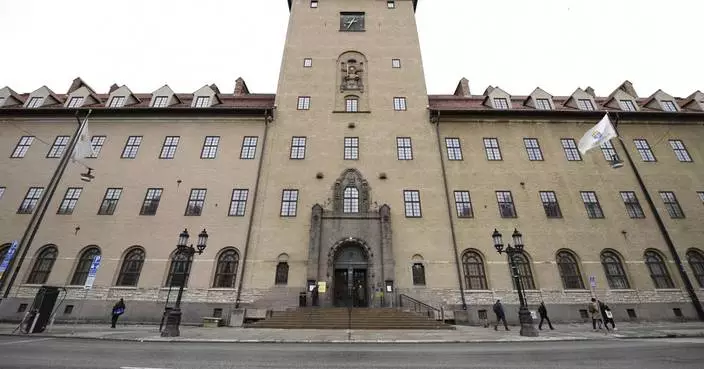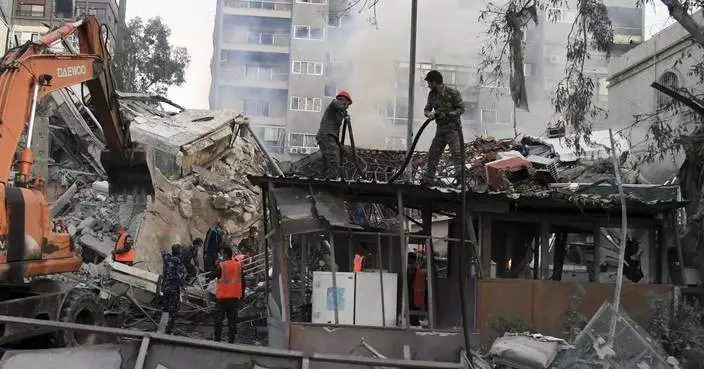Syrian government forces pressed ahead with their offensive in the country's south on Monday despite threats by the Islamic State group to kill civilians it recently captured there.
Syrian state TV and the Britain-based Syrian Observatory for Human Rights, an opposition-linked war monitoring group, both reported government attacks on the Yarmouk basin region in southern Syria.
The area is controlled by a group linked to IS that has been in retreat in recent weeks near the border with Jordan and the frontier of the Israeli-occupied Golan Heights.
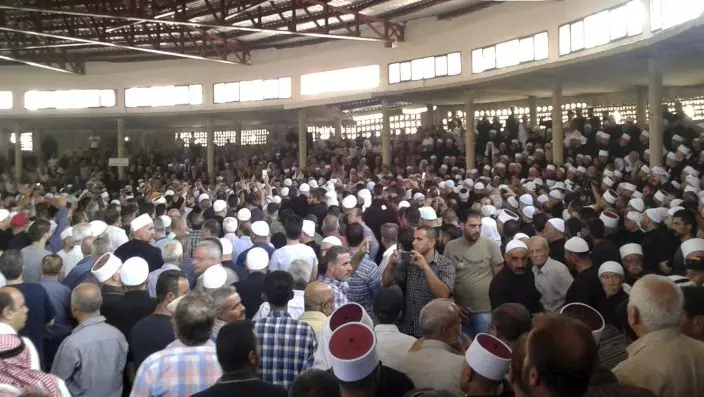
In this photo released by the Syrian official news agency SANA, mourners attend a mass funeral of people killed a day earlier by a series of suicide bombings launched by the Islamic State's fighters on the eastern and northern countryside of the southern province of al-Sweida during a in al-Sweida, Syria, Thursday, July 26, 2018. A Syrian government official says the death toll from coordinated Islamic State attacks on a usually peaceful city and its countryside has climbed to 216, in the worst violence to hit the area since the country's conflict began. (SANA via AP)
Syrian state TV aired live footage from the area in which troops pounded IS positions with multiple rocket launchers.
The Observatory reported that government helicopter gunships pounded several villages held by IS, including Shajara, Abdeen and Koya.
The Observatory said some 4,000 civilians are still present in the small pocket controlled by IS-linked fighters.
The government-controlled Syrian Central Military Media said that government forces and their allies entered the IS stronghold of Shajara from two fronts on Monday, without giving further details.
The Observatory said the offensive resumed Monday after a day of relative calm following the release of a video on Saturday in which a woman said she was being held with other women. The woman said they could be freed if the government releases IS detainees and halts the offensive. She said if the demands were not met the militants would kill the captives.
The extremists abducted around 18 people, mostly women, in a wave of attacks in the nearby province of Sweida last Wednesday that killed more than 200 people.
The Sweida 24, an activist collective in Sweida, said IS sent the photos of 14 women they are holding to their relatives, saying they want to negotiate over them.
Sweida 24 said IS is believed to be holding 30 people, including 20 women whose ages range between 18 to 60. It said IS is also believed to be holding 16 young boys and girls.
The activist group said the bodies of two women were found near the village of Shabki, a focus of Wednesday's attack. One had been shot in the head and the other, an elderly woman, apparently died of exhaustion. Four other women were found alive hiding in a cave, it said.
Those abducted are members of the minority Druze sect. The Druze, followers of an esoteric offshoot of Islam, have kept their own local militias in the area. The Sunni Muslim extremists of IS view them as apostates, and have a history of abducting members of other religious minorities and keeping women as sex slaves.
Until Wednesday, Sweida, home to a predominantly Druze community, had largely been spared from Syria's seven-year-long civil war.
IS has been driven from virtually all the territory it once controlled in Syria and Iraq, but holds scattered pockets of territory in southern Syria and along the border.
BEIRUT (AP) — Amnesty International said Wednesday it has documented widespread abuses, including torture and deprivation of medical care, in detention facilities holding thousands of suspected Islamic State members and their relatives in northeast Syria.
The centers and camps hold about 56,000 people — the majority of them children and teens — and are run by local authorities affiliated with the U.S.-backed, Kurdish-led Syrian Democratic Forces. The SDF and its allies, including U.S.-led coalition forces, defeated the Islamic State group in Syria in 2019, ending its self-proclaimed Islamic “caliphate” that had ruled over a large swath of territory straddling Iraq and Syria.
What to do with the suspected IS fighters and their families has become an intractable issue. Many countries whose citizens traveled to Syria to join IS have been reluctant to repatriate them, as have local communities in Syria.
"People held in this system are facing large-scale violations of their rights, some of which amount to war crimes,” Nicolette Waldman, Amnesty’s senior crisis advisor, told journalists.
The United States is also responsible for the alleged violations because it played a key role in establishing and maintaining the detention system, providing hundreds of millions of dollars to the SDF and affiliated forces and regularly interrogating detainees, Waldman said.
The human rights group interviewed 126 people accused of IS affiliation currently or formerly detained, along with representatives of the local administration and aid workers.
The Amnesty report said the vast majority of detainees are being held “indefinitely, without charge or trial, in violation of international human rights law and international humanitarian law,” while those who have been tried were, in many cases, convicted on the basis of confessions extracted under torture.
The alleged abuses include “beating, stress positions, drowning, electric shocks and gender-based violence,” including a male detainee who said he and others had been sodomized with broomsticks by guards, the report said. Detainees were also deprived of food, water and medical care and subjected to extreme cold and heat in overcrowded cells, with some allegedly dying of suffocation, it said.
The report added that many of the approximately 14,500 women and 30,000 children held had been victims of human trafficking, including women who were forced to marry IS fighters and minors who were forcibly recruited by the group, and that local authorities had failed to set up a “mechanism to identify trafficking victims” and protect them.
The report also criticized the practice of forcibly separating adolescent boys — some as young as 11 or 12 — from their mothers and placing them in rehabilitation centers indefinitely.
Amnesty called on local authorities, the U.S. government and other allies to bring the detention system into compliance with international law and urged the United Nations to work with them to establish a screening process to release all who are not “reasonably suspected” of having committed a serious crime.
The Autonomous Authorities of the North and East Syria Region, the civilian administration affiliated with the SDF, wrote in response to the Amnesty findings that it had not received any official complaints regarding torture in detention facilities and “if this happened, they are individual acts.”
The administration said it would take action against employees who committed violations if evidence is provided. It denied allegations that inmates were deprived of food, water and medical care. It acknowledged overcrowding in the facilities, which it attributed to lack of financial resources to secure larger centers.
The local authorities took issue with the allegation that people were arbitrarily detained, asserting that most detainees “are members of a terrorist organization and were arrested during the battles" and that many had committed crimes against humanity and war crimes.
The U.S. State Department said in its own response that “we share many of (Amnesty’s) concerns” and it has been working to address them. It called on the international community to “aid local entities’ management of these challenges” and for countries with citizens held in detention in Syria to repatriate them.
Waldman said she believes Washington "very likely knew about these poor conditions from the beginning."
She added: “We think that it may not be the case that they are doing everything they can. They need to accept a much greater responsibility, especially since they played such a key role in establishing the situation in the first place."
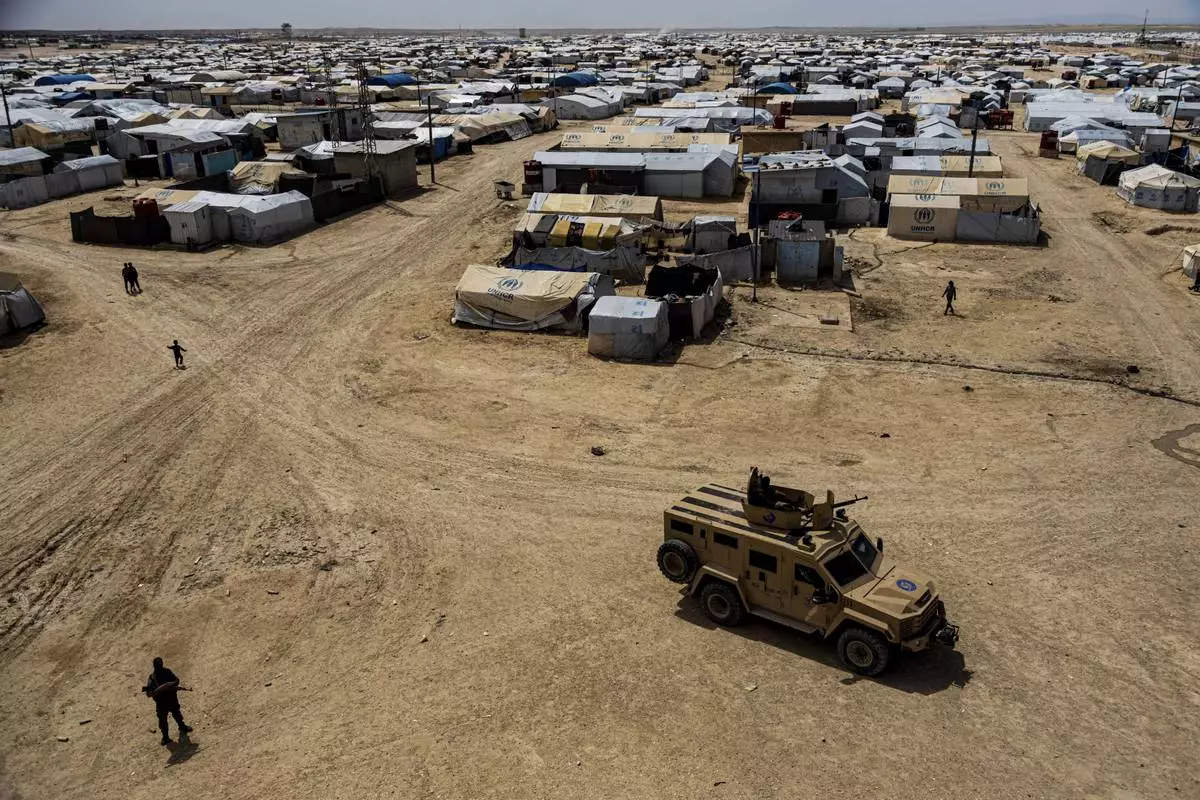
FILE - Kurdish forces patrol al-Hol camp, which houses families of members of the Islamic State group in Hasakeh province, Syria, on April 19, 2023. Amnesty International said Wednesday, April 17, 2024 it has documented widespread abuses, including torture and deprivation of medical care, in detention facilities holding thousands of suspected Islamic State members and their relatives in northeast Syria. (AP Photo/Baderkhan Ahmad, File)
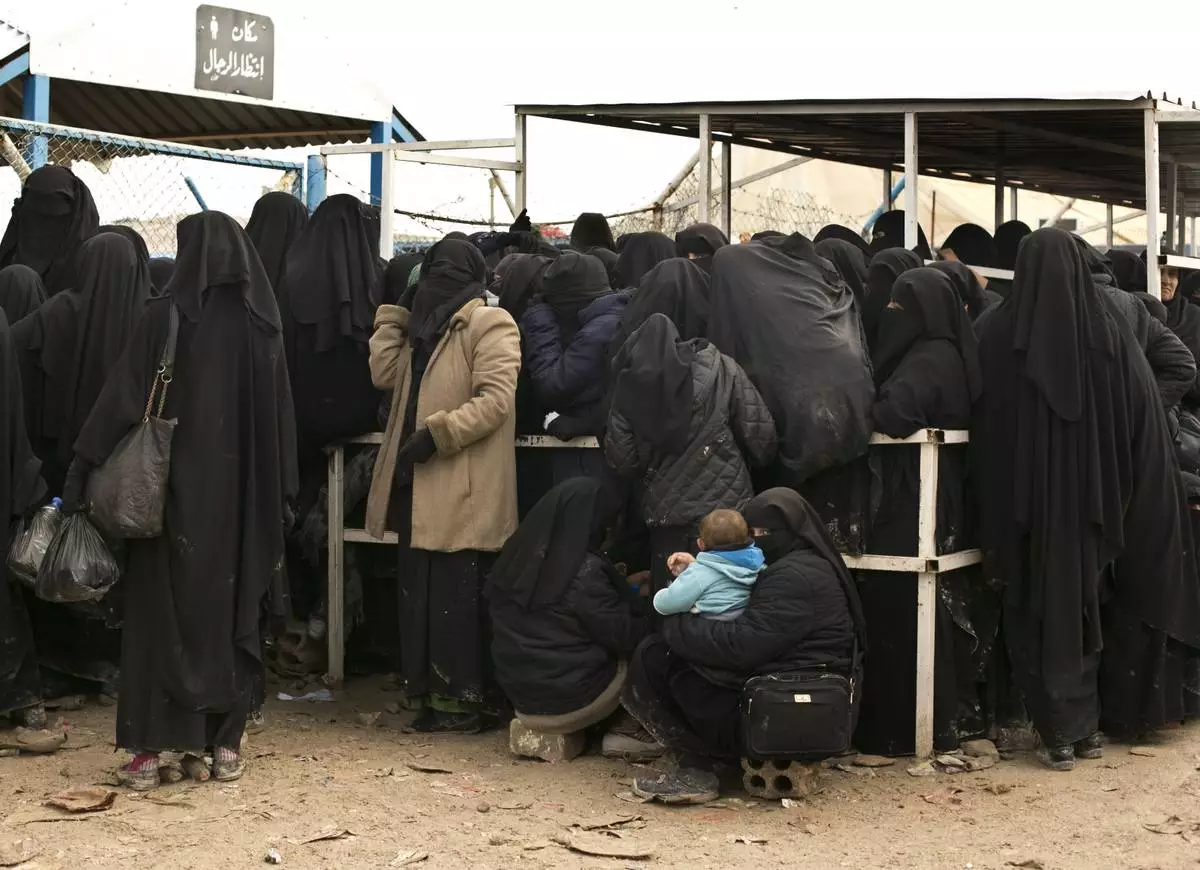
FILE - Women residents from former Islamic State-held areas in Syria line up for aid supplies at Al-Hol camp in Hassakeh province, Syria, March 31, 2019. Amnesty International said Wednesday, April 17, 2024 it has documented widespread abuses, including torture and deprivation of medical care, in detention facilities holding thousands of suspected Islamic State members and their relatives in northeast Syria. (AP Photo/Maya Alleruzzo, File)








